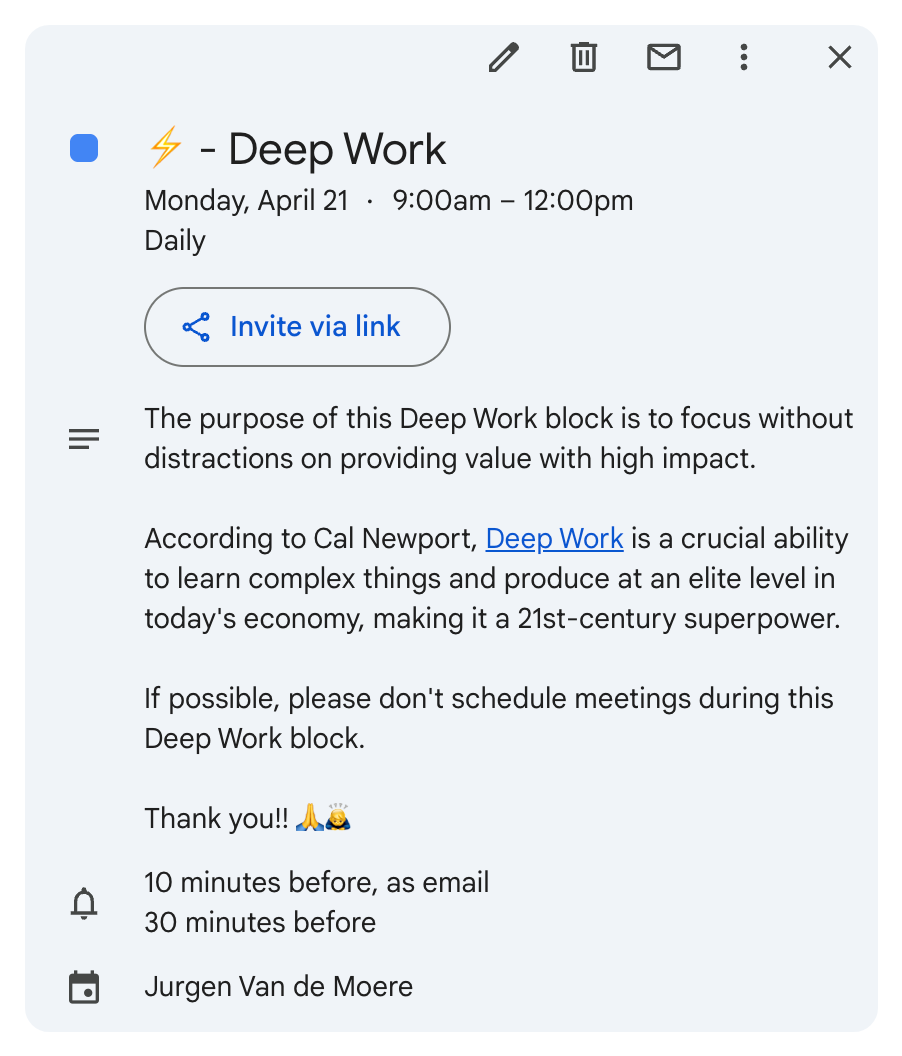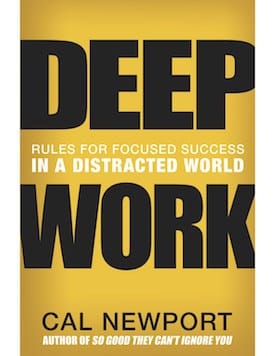How to stay focused in a world that tries to distract you
Have you ever felt like your brain is a pinball bouncing between notifications, Slack messages, meetings, and interruptions? 🤯
In today's hyper-connected work world, it's a common struggle that leaves us feeling drained and unproductive. 🪫
But what if there was a way to take back control of your focus and reclaim your workday and energy? 🔋⚡
In this article, we dive into powerful practical strategies from the brilliant book by Cal Newport called Deep Work: Rules for Focused Success in a Distracted World and how we can apply them in our engineering lives.
Cal Newport is a computer scientist, writer and professor, so he certainly knows first-hand what it's like to be busy, and yet remain incredibly productive.
In just a few minutes, we learn how we can navigate the noise, prioritize deep work, and find more joy and effectiveness in our daily tasks.
Let's get started! 🥳
Why is deep work important?
Let's face it, engineering is brainy stuff! 🧠
Building those elegant Angular components, crafting robust services, and tackling those head-scratching bugs require serious mental muscle.
This is where deep work comes in.
Newport defines it as:
"Professional activities performed in a state of distraction-free concentration that push your cognitive capabilities to their limit. These efforts create new value, improve your skill, and are hard to replicate".
Think about it: have you ever tried to solve a complex problem while your phone buzzes with notifications and Slack pings incessantly?
It feels like trying to build a sandcastle during high tide!
Deep work allows us to truly focus, learn faster, and produce higher-quality work.
It's like putting on your coding goggles and seeing the Matrix—you understand the intricacies and can build amazing things efficiently.
Plus, in our rapidly evolving tech landscape, the ability to quickly learn new, hard things is a massive advantage, and deep work is the key to unlocking that.
How to perform deep work in a world of notifications and distractions
Now, how do we even think about going deep when we're constantly bombarded by the digital world?
It's like trying to meditate in a room full of chatty parrots! 🧘♂️ 🦜 🤯 😰
Fear not!
Here are five practical tips inspired by Deep Work:
Tip 1: Time Blocking: Schedule Your Deep Dives!
Just like you schedule important meetings, block out specific times in your day for focused work. Treat these blocks as sacred—defend them fiercely from interruptions!
Maybe it's the first two hours of your day before the chaos begins, or an afternoon slot where you silence the world.
Put it in your calendar and let your team know you'll be in "deep work mode."
Here is an example of how I schedule Deep Work blocks in my calendar:

Tip 2: Minimize the Noise: Create Your Focus Zone!
Those notifications are like little gremlins stealing your attention.
During your deep work blocks, turn off email, Slack, and social media notifications.
Consider using website blockers or even putting your phone in another room (unless you're expecting news of a winning lottery ticket, of course!).
Create a physical or mental space where you can truly concentrate.
Tip 3: Embrace Single-Tasking: One Thing at a Time, Beautifully Done!
Our brains aren't designed for constant context switching.
Focus on one demanding task during your deep work block rather than trying to juggle multiple things at once.
It's like trying to juggle flaming torches while riding a unicycle—impressive if you can do it, but probably not the most efficient way to get things done!
Tip 4: The Power of "No": Learn to Politely Decline!
We engineers are often helpful souls, but saying "yes" to every meeting and request can leave us with no time for actual engineering!
It's okay to politely decline non-essential meetings and tasks.
Explain that you need focused time to complete your current priorities. Your team will likely appreciate your focused output in the long run.
Tip 5: The Shutdown Ritual: End Your Day Intentionally!
Just as important as starting deep work is ending it properly.
Consider a "shutdown ritual" where you review your day, plan for the next, and consciously decide to stop thinking about work until the next day.
This helps your brain truly rest and recharge for more deep work tomorrow.
✅ Top Things to Do for Deep Work
- Schedule dedicated deep work blocks in your calendar.
- Minimize all digital and physical distractions during these blocks.
- Focus intently on one cognitively demanding task.
- Communicate your deep work schedule to your team.
- Practice saying "no" to non-essential interruptions.
- Establish a "shutdown ritual" to end your workday.
❌ Top Things to Avoid for Deep Work
- Constantly check emails or Slack messages.
- Engage in social media or browse unrelated websites.
- Attend unnecessary meetings.
- Attempt to multitask on complex tasks.
- Leave notifications turned on.
- Forget to schedule breaks (even deep divers need air!).
Summary
Embracing deep work isn't about becoming a hermit in a soundproof room (though that does sound tempting sometimes 😂).
It's about intentionally carving out time for focused, high-quality work amidst the daily whirlwind. 🌪️
By understanding why deep work matters and implementing these practical tips, we can level up our skills, produce truly impressive results, and even find more joy and satisfaction in our engineering endeavours. 🚀
We might even surprise ourselves with what we can achieve when we give our engineering brain the focused attention it deserves! 🎯
Let's go deep and build great things! 💪
Have a great one! ☀️
Thank you! 🙏🙇
